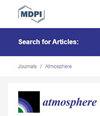Development of Wet Scavenging Process of Particles in Air Quality Modeling
IF 2.3
4区 地球科学
Q3 ENVIRONMENTAL SCIENCES
引用次数: 0
Abstract
This study presents an improved wet scavenging process for particles in air quality modeling, focusing on the Korean Peninsula. New equations were incorporated into the air quality chemical transport model (CTM) to enhance the simulation of particulate matter (PM) concentrations. The modified air quality CTM module, utilizing size-dependent scavenging formulas, was applied to simulate air quality for April 2018, a month characterized by significant precipitation. Results showed that the modified model produced more accurate predictions of PM10 and PM2.5 concentrations compared to the original air quality CTM model. The maximum monthly average differences were 5.46 µg/m3 for PM10 and 2.87 µg/m3 for PM2.5, with pronounced improvements in high-concentration regions. Time-series analyses for Seoul and Busan demonstrated better agreement between modeled and observed values. Spatial distribution comparisons revealed enhanced accuracy, particularly in metropolitan areas. This study highlights the importance of incorporating region-specific, size-dependent wet scavenging processes in air quality models. The improved model shows promise for more accurate air quality predictions, potentially benefiting environmental management and policy-making in the region. Future research should focus on integrating more empirical data to further refine the wet scavenging process in air quality modeling.开发空气质量模型中的颗粒物湿清除过程
本研究以朝鲜半岛为重点,介绍了空气质量建模中改进的颗粒物湿清除过程。在空气质量化学传输模型(CTM)中加入了新方程,以增强对颗粒物(PM)浓度的模拟。修改后的空气质量 CTM 模块利用与粒径相关的清除公式,用于模拟 2018 年 4 月的空气质量,该月降水量较大。结果显示,与原始空气质量 CTM 模型相比,修改后的模型对 PM10 和 PM2.5 浓度的预测更为准确。PM10 的最大月平均差异为 5.46 µg/m3 ,PM2.5 的最大月平均差异为 2.87 µg/m3,在高浓度区域有明显改善。对首尔和釜山的时间序列分析表明,模拟值和观测值之间的一致性更好。空间分布比较显示,特别是在大都市地区,准确性有所提高。这项研究强调了在空气质量模型中纳入特定区域的、与大小相关的湿清除过程的重要性。改进后的模型有望更准确地预测空气质量,从而为该地区的环境管理和政策制定带来潜在益处。未来的研究应侧重于整合更多的经验数据,以进一步完善空气质量模型中的湿清除过程。
本文章由计算机程序翻译,如有差异,请以英文原文为准。
求助全文
约1分钟内获得全文
求助全文
来源期刊

Atmosphere
METEOROLOGY & ATMOSPHERIC SCIENCES-
CiteScore
4.60
自引率
13.80%
发文量
1769
审稿时长
1 months
期刊介绍:
Atmosphere (ISSN 2073-4433) is an international and cross-disciplinary scholarly journal of scientific studies related to the atmosphere. It publishes reviews, regular research papers, communications and short notes, and there is no restriction on the length of the papers. Our aim is to encourage scientists to publish their experimental and theoretical research in as much detail as possible. Full experimental and/or methodical details must be provided for research articles.
 求助内容:
求助内容: 应助结果提醒方式:
应助结果提醒方式:


